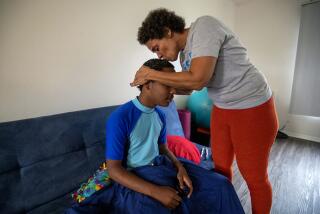Boy’s Monthly Commute Ending : Court Orders Halt to 6-Year-Old’s ‘Extreme’ Custody Predicament
- Share via
One Friday afternoon each month, a solemn-faced and slender blond-haired boy would enter San Francisco International Airport, his hand planted firmly inside the tense hand of his mother.
As business people with briefcases scurried to catch the 4 p.m. commuter flight to Los Angeles, Joshua Fingert, 6, shouldered a red nylon backpack--which held his favorite Smurf doll, a pack of gum and boxed juice--kissed his mother goodby and joined the exiting throng.
For the next week, the child would live with his father and attend public school in Ventura County, in accordance with a court order that split custody between the divorced parents separated by 500 miles and irreconcilable differences. Seven days later, Joshua would board another plane and hurtle back to his mother, his Bay Area friends and the private school he attended the remaining three weeks of each month.
On Monday, however, a Ventura County Superior Court judge brought Joshua’s three-year commute to a grinding halt--ending what many California educational and family law experts called a ridiculous and even harmful arrangement.
‘People Were Shocked’
“It was an extreme situation. People were shocked to hear of it,” said Judith Wallerstein, executive director of the Center for Families in Transition, a Bay Area-based research and counseling center. She says a bill awaiting Gov. George Deukmejian’s signature would make it more difficult for judges to approve such “silly” joint-custody arrangements.
Wallerstein, who helped draft the bill, said the current law allows judges to award joint custody even when parents live far away and young children are traumatized by shuttling back and forth. The new law would underscore the state’s commitment to securing an arrangement in the child’s best interest.
After an all-day hearing Monday, Judge Charles R. McGrath ordered that Joshua live and attend school full time in Ventura County where his father, 37-year-old Michael Fingert, lives and owns a wholesale nuts-and-bolts company.
McGrath did not alter the custody arrangement. He said Joshua should continue to live with his father one week each month and recommended that Joshua’s mother, 37-year-old Pamela Besser, relocate to Ventura County so the child could remain with her the other three weeks.
McGrath said he considered granting summer custody to Fingert while ordering Joshua to spend the school year in Foster City, a San Francisco suburb where mother and son have lived for 3 1/2 years.
Ultimately, however, the judge said he relied on the recommendation of Dr. Robert Beilin, a family therapist and senior mediator for Ventura County, who urged that the mother relocate. Beilin said he was swayed by the fact that Fingert owned a home and a 10-year-old business in Ventura and had offered to help his ex-wife move. Besser had just launched a small health care newsletter in the Bay Area but did not have substantial financial ties there, Beilin told the judge.
“There are pretty strong equities both ways,” McGrath noted just before pronouncing his verdict.
Besser, an articulate, poised woman, appeared stunned by the judge’s decision. In the court hallway later, she fought back tears and vowed to move immediately to Ventura.
“What else can I do? Otherwise I’ll lose my son, and he means more to me than anything in the world,” she said.
But she had harsh words for the judge’s decision.
“We’re well-rooted in the community. . . . Josh has had the same set of playmates since he was 3. . . . I think it’s cruel to pull him out of his school and away from his friends.”
But Fingert said his son would suffer without his father nearby. “Joshua and I need to be together,” he testified Monday. “We’re father and son.”
NOW Observers Outraged
The National Organization for Women “courtwatchers,” a group that monitors family law cases, was also outraged. Spokeswoman Diana Hires, who attended the Fingert hearing, charged that McGrath favored the father and failed to act in the best interest of the child.
Fingert, a handsome, clean-shaven man who stood soldier-straight at the hearing and conferred frequently with his second wife, has steadfastly declined comment on the case. McGrath left for vacation after the hearing and was unavailable for comment.
And Joshua?
The boy did not have to testify at Monday’s hearing. But Besser said he registered both sadness and curiosity when told of the latest change in his life.
“At first he started to cry. He said, ‘Does that mean I’m not going to see. . . ?’ and then he started naming all his friends and teachers up here,” Besser said.
Those teachers, as well as a battery of doctors, psychologists and counselors, paint Joshua as a smart, engaging, almost too-serious child. They say he has suffered from the fallout of his parents’ divorce and ensuing custody battle, which has raged bitterly throughout his brief life.
“The child is bearing the burden of his parents’ continuing conflicts. He loves both of his parents and worries about pleasing . . . them, even to the detriment of his own needs,” Ventura psychologist Kathryn M. Davis wrote in an evaluation letter in June.
‘Overwhelming . . . Demands’
The emotional turmoil has at times led to severe stomachaches, depression, crying jags and a withdrawal from his peers, according to court documents.
Beilin, in his testimony, said both parents placed “overwhelming emotional demands” on Joshua, behaved in an “irrational” manner and were unable to resolve their acrimonious disputes despite repeated counseling. He called the Fingert custody case one of the most difficult of the 2,300 cases he has handled over 11 years.
Joanne Schulman, a family law attorney in Oakland who also worked on the new child-custody bill, says children of divorced families often shuttle back and forth on weekends, but that she hasn’t heard of any cases as extreme as Joshua’s.
“What’s more common is where they’re making the child change schools at the semester. It’s devastating. . . . Judges and mediators are asking children to do what they would not ask adults to do, which is to split their home cycles,” Schulman said.
The battle over Joshua started before his birth, court documents and interviews show.
Pamela Besser said she met Fingert in Chicago, when they were both 16. They were introduced by relatives and promptly became high school sweethearts, she said. They moved in together in 1970 and married six years later. In 1979, the two settled in Ventura, where Fingert thought opportunities were ripe to start a bolt business.
Full Custody Granted
In 1981, Besser discovered that she was pregnant. This news did not please Fingert, who accused her of secretly abandoning her birth-control pills at a time when the couple’s marriage was failing. After relentless fighting, Fingert moved out of their East Ventura house.
Joshua was born Feb. 1, 1982, and, in the subsequent divorce, Pamela Besser was granted full physical custody of the child, with Fingert to be allowed reasonable visitation rights.
Soon afterward, Fingert began to develop paternal feelings for his son.
“Within a few weeks, Joshua became the most important thing in my life,” he wrote in a 1983 court petition asking that he be allowed to take Joshua on four-day visits when the boy was 13 months old.
That provoked the first custody battle and led to a complicated settlement involving shorter visitation times for Fingert.
When Joshua was 3, the parents worked out the one-week/three-week schedule at the recommendation of psychologists they had consulted. At the time, Besser was living in San Diego, and the parents would meet halfway at an Anaheim restaurant to hand over Joshua. Court documents paint an ugly scene of the meetings, with Joshua crying in the car, Besser tape-recording her ex-husband’s conversation and, according to Fingert, threatening to take Joshua away for good--which Besser denies.
Sought Better Solution
In 1985, Besser and Joshua moved to the Bay Area, and the boy began his monthly flights. By the time Joshua started kindergarten last year, both parents felt that the arrangement was potentially harmful, according to Besser, and asked Ventura County Superior Court Judge Edwin M. Osborne to come up with a better solution.
But Osborne saw none. He said this week that he was never presented with evidence that Joshua had experienced emotional problems as a result of the split schedule. While it was “unusual, it seemed to be working well at that time,” he said.
Family law experts say such a split sometimes works until a child enters school, but that it should then be revised.
“I think that’s a tough arrangement for a kid to get used to,” said Dr. Gary Chase, a psychiatrist who heads the psychiatric panel for Los Angeles Superior Court’s family law division. He said attending two schools and having two sets of friends is disruptive, but added that “it’s conceivable the child will suffer minimally if both parents are loving.”
In an attempt to bring the Fingert and Besser together, Beilin, the mediator, has recommended that mother, father and son attend counseling together once Besser returns to Ventura County. And he has scheduled another mediation session next week.
But the differences are already percolating.
Joshua started first grade four days ago in Foster City, but the judge has ruled that he must be attending school in Ventura County by Monday.
Besser says she’d like to enroll Joshua in a Ventura elementary school. Fingert is in the process of moving from Camarillo to a planned community in Moorpark, where he has already enrolled Joshua in a school there.
More to Read
Sign up for Essential California
The most important California stories and recommendations in your inbox every morning.
You may occasionally receive promotional content from the Los Angeles Times.










